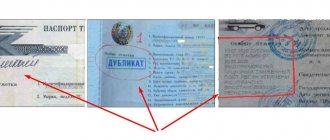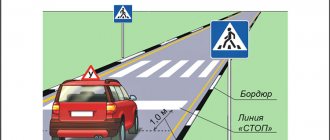Difference from similar articles
When deciding on a punishment, the article under which the actions of the guilty person are qualified is taken into account, therefore it is necessary to understand the types of crimes that are similar to theft, but provide for a different punishment and fix responsibility under another article of the Criminal Code of Russia. In particular, the actions of a guilty person are recognized as car theft only after confirmation of the motive. A similar criminal offense is theft of a vehicle.
| The difference between theft and theft | |
| Hijacking | Theft |
| The motive can be selfish (the goal is to use someone else’s vehicle for free, to ride for free) or other (the goal is revenge, envy, to scare). | The motive is exclusively selfish, the goal is to seize a stolen vehicle and turn it into one’s own favor in any form - disassembly and sale in parts, resale, personal use. |
| The commission may be associated with an attack on the owner, that is, it may be open. | Only secret seizure, when the owner of the car has no idea that a crime has been committed. |
| The punishment is imposed under Article 166 of the Criminal Code. | Prosecution occurs under Article 158 of the Criminal Code of Russia. |
Details: Punishment for theft under Article 158 of the Criminal Code of the Russian Federation
The following types of taking will not be recognized as theft:
- use of a car by a close relative, acquaintance, former spouse who previously received (or had reason to believe that he had the right to) a permit to drive a vehicle;
- operation of a company car by a company employee.
Attention! If, along with the theft of a car, a person stole property that was in the car (for example, a radio was stolen and sold, then additionally the actions are qualified under Article 158 - theft).
Additionally, it is necessary to distinguish theft (provided for in Article 166 of the Criminal Code of Russia) from the following types of violations:
- Fraud, that is, obtaining property rights to transport by deception or abuse of trust of the injured party. Punishment is applied on the basis of Article 159 of the Criminal Code of the Russian Federation, depending on the value of the stolen property and other conditions. For example, the most severe punishment for theft of vehicles worth over a million rubles is up to 10 years in prison.
- Robbery is the open taking of a car without the use of weapons or brute force (threat of physical violence). This means that the offender was aware that his criminal actions were obvious to the owner or other people around him. Liability is established under Article 161 of the Criminal Code. The maximum penalty is up to 12 years in prison.
- Robbery, that is, open seizure of a car using weapons or physical force (the threat of using it). The punishment will be imposed under Article 162 of the Criminal Code of the Russian Federation, with a maximum of up to 15 years in prison.
What is this
Car theft is classified as an unlawful act aimed at using someone else's vehicle without the consent of its owner and without the purpose of appropriating the vehicle.
Theft is the secret taking of a vehicle, often with the intention of enriching oneself.
Category Features:
- the act entails the imposition of penalties on the offender;
- the severity of the consequences caused by the crime is taken into account;
The following acts are not considered theft:
- driving your own vehicle that is not registered within the established period;
- use of a vehicle by persons related to its owner (provided that the former previously drove such a vehicle with the consent of the legal owner);
- use by a company driver of a company car outside of working hours and without appropriate approval;
- use of vehicles in the event of emergencies and force majeure situations.
Corpus delicti
A suspect can only be brought to justice if his actions contain all the signs of a crime committed - theft, which are discussed below.
Guilty person - subject
A person who meets the following criteria can be held accountable:
- Individual (criminal punishment of organizations is impossible).
- Sanity (the absence of a stable or temporary mental disorder that interferes with awareness of one’s actions).
- Reaching the age of criminal responsibility is 14 years.
Attention! If during pre-trial proceedings it is established that the offense was committed by a minor citizen (that is, under 14 years of age), then other measures will be applied to him. Registration with the police is mandatory.
Attitude towards an unlawful act - the subjective side
Punishment for car theft is imposed only if the person committed the actions intentionally, that is, he understood that he was violating the law and the rights of others, but deliberately wanted unlawful consequences to occur.
Committing actions aimed at unlawfully taking possession of a car - the objective side
All actions aimed at taking possession of a car or other type of transport entail liability for theft. According to the Supreme Court Resolution No. 25, activation of the engine is optional, that is, punishment will be applied for the following types of actions:
- rollback;
- transportation by other transport;
- towing;
- hacking the system and leaving.
In addition, it is necessary to confirm the presence of the following mandatory characteristics:
- Illegality , that is, the person at fault did not obtain permission to use the transport and had no reason to believe that such permission had been granted.
- Confirmation of a motive that is not related to theft.
Important! The crime is considered completed from the moment the location of the vehicle changes. Even moving a few meters by any of these methods will be regarded as theft, which entails liability under Article 166 of the Criminal Code.
Object and types of transport, the possession of which entails punishment
Object – the ownership right of the owner of the vehicle. The subject of the crime may be a car or other vehicle. The category of other transport includes all mechanical modes of transport, namely:
- urban transport (trams, buses, trolleybuses);
- two-wheeled transport (mopeds, motorcycles);
- ATVs;
- agricultural machinery;
- construction self-propelled machines.
The full list and requirements for transport are indicated in the contents of the Resolution of the Supreme Court of Russia No. 25 of 2008 (hereinafter, Plenum of the Supreme Court No. 25).
Liability of a minor
According to the criminal code, minors can be held accountable.
When assigning a punishment or term for car theft in Russia, a person who has not reached the age of majority takes into account (Section 5 of the Criminal Code of the Russian Federation):
- gravity of the act (committed individually or by a group; in conspiracy or without it, with the use of violence, weapons, etc.);
- age of the young attacker (minimum limit - 16 years );
- the amount of damage caused to the owner of the vehicle.
When considering the category of hijacking cases involving minors and without aggravating circumstances, the court is inclined to apply the most lenient types of punishment, due to the fact that the person (due to age) may have a weak psyche and is susceptible to the influence of others.
Punishment for car theft
Punishment is applied only by the court after the completion of the pre-trial investigation and after the end of the trial of the case, the establishment and documentary recording of the circumstances of the crime.
Responsibility for the crime depends on the part of the article, which indicates aggravating features for which a more severe punishment is established.
According to Part 1 of Art. 166 punishment for “simple” unlawful taking of a vehicle without the purpose of theft:
- a fine of up to 120 minimums or no more than the total income of the guilty person for one year of work;
- restriction of freedom for no more than 3 years;
- forced labor for a maximum of 5 years;
- arrest up to 0.5 years;
- imprisonment for up to 5 years.
According to Part 2 of Art. 166 for actions committed by a group of persons (two or more people) by prior conspiracy or theft with the use of violence not dangerous to health (threat of using it), liability is stricter:
- a fine of up to 200,000 rubles or the amount earned by the suspect for one and a half years of work;
- forced labor for five years;
- imprisonment for no more than seven years.
Under Part 3, if committed by an organized group or causing particularly large damage, the punishment is imprisonment for up to ten years.
Under Part 4, for the use of violence dangerous to health (the threat thereof), imprisonment for a term of no more than 12 years may be imposed.
Attention! The theft of a police car is not grounds for applying more severe liability, that is, the punishment is imposed under one of the specified parts of the article. But, depending on the motive, the court may accept this as an aggravating circumstance.
Aggravating and mitigating circumstances
Depending on the circumstances of the crime, the court may impose punishment, but only within the limits provided for in the article.
The chosen type of punishment is influenced by the attitude of the guilty person to the crime, reconciliation of the participants, and compensation for losses. Additionally, the court may take into account circumstances that influence the choice of a more severe punishment, but only within the framework of the article (aggravating - specified in Article 63 of the Criminal Code of the Russian Federation). Also, those conditions that, on the contrary, alleviate liability (mitigating - specified in Article 61 of the Criminal Code of the Russian Federation) can be taken into account.
Drunk driving
The Criminal Code of the Russian Federation in some articles directly indicates the state of intoxication resulting from the use of alcohol, drugs or other potent, intoxicating and other similar drugs and drugs as an aggravating circumstance. The article in question 166 is not one of them.
However, Part 1.1 of Art. 63 of the Criminal Code of the Russian Federation (Aggravating Circumstances) provides the court with the opportunity to recognize the commission of a crime while intoxicated as a sign that aggravates responsibility. In doing so, he must take into account a number of circumstances, such as the social danger of the act, the circumstances in which it was committed, the personality of the person held accountable, and also motivate his decision in the verdict.
That is, the fact of driving while intoxicated in itself is not a basis for recognizing it as an aggravating circumstance.
Punishment for kidnapping of minors
If a minor took part in the hijacking, then all types of liability provided for in Article 166 will be applied to him, but to a lesser extent.
The types and limits of these punishments are given in Art. 88 of the Criminal Code of the Russian Federation. In addition, the following types of sanctions may be applied to minor offenders:
- compulsory educational measures;
- placement in special closed-type correctional (educational) institutions.
If the perpetrator is under 14 years of age, the impact occurs in accordance with the provisions of Federal Law No. 120 of June 24, 1999. As a measure of liability, placement in special educational institutions of open or closed type may be used.
Attempted hijacking
If a person began to carry out actions aimed at stealing a car, but then he himself refused to commit a crime (theft) provided for in Article 166 of the Criminal Code of the Russian Federation, then his actions can be regarded as a voluntary renunciation of the crime.
Punishment, in this case, may be imposed depending on the consequences that occur. That is, instead of an article for hijacking, a different punishment may be imposed, depending on the corpus delicti and the violation committed. For example, if the actions are stopped after breaking the lock, then an article for causing damage to someone else’s property may be applied.
An attempted theft (or, in legal language, an attempted theft) can be considered a situation where the offender stopped unlawful actions aimed at taking possession of the car due to circumstances beyond his control. For example:
- appearance of the owner or witnesses;
- it was not possible to open the locks or disable the alarm.
Important! In case of an incomplete attempt to steal, a punishment will be imposed that does not exceed ¾ of the maximum possible punishment provided for in Art. 166 of the Criminal Code.
Difference between theft and hijacking
Theft and theft are both articles provided for by the Criminal Code of the Russian Federation, each of which has its own qualifications.
Drawing. Classification
| Theft | Hijacking |
| Art. 158 of the Criminal Code of the Russian Federation | Art. 166 of the Criminal Code of the Russian Federation |
| a direct indication of the illegal circulation of property in one’s favor | does not imply the purpose of vehicle theft |
| provides for the following purposes: car resale; subsequent use for personal purposes on an ongoing basis | provides for the following purposes: use as an object for temporary movement |
| related articles: art. 161, 162 of the Criminal Code of the Russian Federation | related articles: art. 161, 162 of the Criminal Code of the Russian Federation |
Statute of limitations for prosecution
The statute of limitations is the period of time during which a person can be held accountable. This period is calculated from the day the crime was committed. It varies depending on the imputed part of Article 166.
| Part of Article 166 | Severity | Prescription of liability |
| 1 | average | 6 years |
| 2 | Heavy | 10 years |
| 3 | Heavy | 10 years |
| 4 | Particularly severe | 15 years |
Did the article help you?
Not really
Liability of a foreigner
As a general rule, regardless of what nationality a person who commits a crime on the territory of Russia bears, he bears the full responsibility provided for by the legislative acts of our country.
There are exceptional cases (very rare) when punishment can be imposed based on:
- norms of international law;
- internal agreements between Russia and the country whose citizen the attacker is;
- legal norms only of the country in which the offender has citizenship.
Do you want to understand how to contact your insurance company to reduce losses due to theft? Read about this in the article: theft insurance. Detailed statistics on thefts are presented here.
Don't know how to check your car for theft? See about it here.
What criminal liability is provided?
Is a suspended sentence possible?
The Criminal Code of the Russian Federation provides for the possibility of probation. This means that the convicted person is assigned a probationary period, during which he proves his correction. At the same time, additional responsibilities are imposed on him, for example: the obligation to get a job, begin treatment for alcoholism, drug addiction or a sexually transmitted disease, and not change the place in which he lives.
The court cannot assign a conditional sentence in the following cases:
Thus, when stealing a vehicle, Article 73 of the Criminal Code of the Russian Federation (suspended sentence) can be applied.
In each specific case, the court evaluates the circumstances of the case, the social danger, and only then makes a decision: whether the convicted person can reform without isolation from society.
Example.
For example, Grachunov I.N. I saw the ignition key lying on the table. Taking it for himself, he was able to open a car parked at the entrance that did not belong to him and take it for a ride.
Grachunov admitted his guilt, and the Dmitrov City Court of the Moscow Region considered that in relation to Grachunov I.N. a suspended sentence may be applied, because he repented of his crime and partially compensated the damage to the victim. For a year he is prohibited from changing his place of residence without the notification and consent of the criminal-executive inspection.
Also, if Grachunov violates public order, that is, commits an administrative offense or crime, then the suspended sentence will be revoked and he will have to serve the assigned sentence.
Recommended reading:
Judicial practice and realities of Russia
Cars are often stolen in Russia. This is caused primarily by a significant increase in the role of motor transport in the lives of Russians. They rarely find intruders, since most of them act carefully and quickly, having become skilled at disassembling into spare parts and individual units.
Although the law provides for harsh punishments, they do not frighten attackers, but only encourage them to commit a secret act.
Even if they are caught, they manage to get out with minimal consequences for themselves. It is enough to say the cherished phrase in court - “I stole it for a ride” and unless they prove otherwise, the punishment will be minimal and frivolous.








